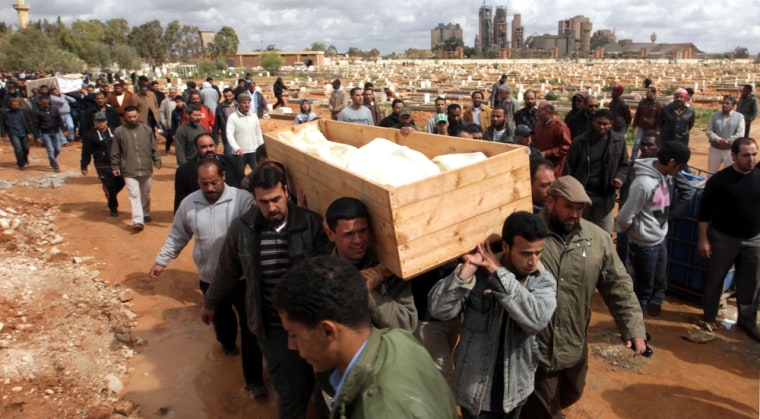These are tough days for two doctors in Misrata, Libya's third largest city.
Farij, an anesthesiologist, and Abubaker, an ophthalmologist, have been working tirelessly to treat people injured in clashes between Libyan leader Moammar Gadhafi's security forces and opposition protesters.
Since last week, some 300 injured have sought medical care and another 27 were killed in the fighting, according to the doctors. All told, at least 32 people have died in the clashes in the city, which is on the Mediterranean coast about 125 miles east of Tripoli.
"They are shooting by anti-aircraft," Abubaker said in a video call with msnbc.com (Neither he nor Farij wanted their last names used out of fear for their safety). "We found someone without a brain. ... We received two people that are completely burned. We don't know if and how to recognize them."
The areas to the east and west of Misrata are controlled by Gadhafi loyalists, though protesters are in charge in the city — except for a part of an air base, where some of the heaviest fighting has been reported, Abubaker said. The attack at the airport began when protesters went to the area and asked the security forces to join them, he said.
Among the casualties Abubaker said he had treated were two girls, ages 6 and 8, who were injured when their home was hit during the fighting. Their father was killed, he said.
Abubaker — who owns a clinic but is volunteering at a local hospital — said the medical situation was critical.
"We have a very big shortage ... of medications," including antibiotics and anesthetic drugs, as well as antiseptic solutions, syringes, gloves and gowns, he said. "We have maybe one week or even less to cover our injured people."
They are seeking help from international health organizations, but for the moment, "there is no way to get any support."
"I feel so sorry. The people here, they are not angry. They are looking for only freedom ... real democracy," Abubaker said. "It's a high price we have to pay for freedom."
Farij said there were only four ventilators in the intensive care unit, forcing the staff to take people off of the machines as soon as possible to free up the equipment. The city's main hospital has been under renovation for three years, leaving just one other hospital and three clinics available to treat patients.
In Benghazi, Libya's second-largest city and the opposition stronghold in the country's east, doctors have reported 256 people dead and about 2,000 wounded in the violence, said Hicham Hassan, a spokesman for an International Committee of the Red Cross team there.
Local doctors told the ICRC that the situation has stabilized in Benghazi's hospitals, "in the sense that they stopped receiving more casualties and they treated a big part of the casualties that they had," Hassan said.
But the doctors said there was a shortage of nurses, since many of them were foreigners who had been evacuated. They also were in need of medicines to treat chronic illnesses, such as cancer, diabetes and HIV/AIDS, he said.
In Paris, French Prime Minister Francois Fillon said Monday that planes were heading to the Benghazi with medical staff and supplies. "It will be the beginning of a massive operation of humanitarian support for the populations of liberated territories," he told RTL radio.
The New York-based Human Rights Watch has put the death toll in Libya at nearly 300, according to a partial count from last week. But Italy's Foreign Minister Franco Frattini described estimates of some 1,000 people killed as "credible."
